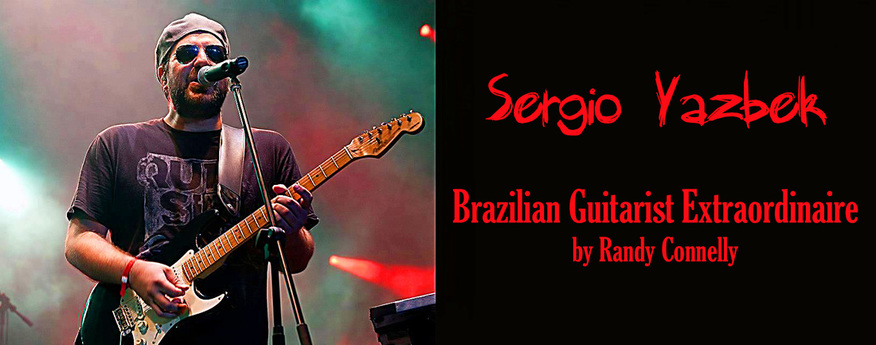“The road is not as easy as people think. It was a lot of work on the road. Cidade Negra sold over 10 million records with many going gold and platinum. We played shows such as Rock in Rio and I’ve played to crowds of well over 2 million people. I was able to tour in different countries around the world and have a rich musical experience. Even though all of these things were great, what really mattered to me the most was the recognition. I was able to meet most all of my idols and even played on stage with them. The best part is when the people you admire now respect you. To be recognized by your idols, this is a dream come true. But like any dream, it must come to an end. After 15 years of non-stop touring, recording 6 CD’s and 3 DVD’s, it was time to call it quits.”
These are the words of Sergio Yazbek, the renowned guitar player in Brazil who toured and recorded with the famous Brazilian band Cidade Negra. Sergio has done more on guitar than most can only dream of. He’s been a staple in Brazil’s ‘Guitar Player’ magazine and was the lead guitar player for one of Brazil’s top bands. Yet with all the talent that flows through his veins, Sergio is one of the most humble human beings you will ever meet. Please join us as we take peek into the life of Sergio Yazbek. enFOCUS caught up with Sergio as he starts his new life here in Austin, TX and we wanted to share his story with you.
These are the words of Sergio Yazbek, the renowned guitar player in Brazil who toured and recorded with the famous Brazilian band Cidade Negra. Sergio has done more on guitar than most can only dream of. He’s been a staple in Brazil’s ‘Guitar Player’ magazine and was the lead guitar player for one of Brazil’s top bands. Yet with all the talent that flows through his veins, Sergio is one of the most humble human beings you will ever meet. Please join us as we take peek into the life of Sergio Yazbek. enFOCUS caught up with Sergio as he starts his new life here in Austin, TX and we wanted to share his story with you.
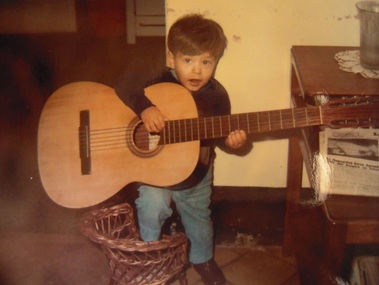
The Early Years
Sergio was born in Paraguay and lived there for a year and a half. He and his family then moved to Sao Paulo. Sergio had a great childhood with great parents. In his early days he spent his time raising fish, a far cry from the mega stages he’d play on later in his life. “My dad was an airplane pilot and always liked music. My grandmother was a piano player and was a student of Guiomar Novaes. She always played for us,” he said. Sergio’s grandfather on his mother’s side was a violin and guitar player so musicians were in the family.
Sergio began playing guitar at the age of 11 and by the time he was in High School he was a pro. “I listened to a lot of music growing up. My mom gave me Beatles albums and I listened to them every day,” he said. Sergio really liked the Beatles Blues Album. It was more of a psychedelic album and Sergio enjoyed Psychedelic music. “I went to see KISS at the age of 13. It was one of the first International concerts in Brazil and was a big deal. If my dad had plans for me, they went out the window that night. Then Clapton came. That night I knew I wanted to be a musician,” he said.
Sergio’s first guitar was a Spanish guitar. He got a pickup for it and started rehearsing with it. Later he went and heard “a real guitar” and Sergio had to have one. “My dad bought me a Paul Stanley ‘Iceman copy’ guitar when I was 14. I learned chords out of magazines,” he added. Sergio formed a band at the age of 14. The first concert he ever performed was at the drummer’s house in front of parents. “The band kept changing members as kids would go off to college or find others things to do,” he said. At 15 Sergio was playing clubs and making money. He knew this was something that he always wanted to do. “My parents feared for me, but they also supported me,” he said. Brazil is a bit different than in the USA in that many kids stay home with their parents until they get married. His dad told him, “I don’t want you to blame me so you can live with us as long as you need. I can’t give you money or houses, but I can give you time.” Sergio said he took advantage of that time. The band he was in rehearsed every day from 2:00-7:00 in his parent’s basement. The rest of the time he spent practicing on his own.
Sergio was born in Paraguay and lived there for a year and a half. He and his family then moved to Sao Paulo. Sergio had a great childhood with great parents. In his early days he spent his time raising fish, a far cry from the mega stages he’d play on later in his life. “My dad was an airplane pilot and always liked music. My grandmother was a piano player and was a student of Guiomar Novaes. She always played for us,” he said. Sergio’s grandfather on his mother’s side was a violin and guitar player so musicians were in the family.
Sergio began playing guitar at the age of 11 and by the time he was in High School he was a pro. “I listened to a lot of music growing up. My mom gave me Beatles albums and I listened to them every day,” he said. Sergio really liked the Beatles Blues Album. It was more of a psychedelic album and Sergio enjoyed Psychedelic music. “I went to see KISS at the age of 13. It was one of the first International concerts in Brazil and was a big deal. If my dad had plans for me, they went out the window that night. Then Clapton came. That night I knew I wanted to be a musician,” he said.
Sergio’s first guitar was a Spanish guitar. He got a pickup for it and started rehearsing with it. Later he went and heard “a real guitar” and Sergio had to have one. “My dad bought me a Paul Stanley ‘Iceman copy’ guitar when I was 14. I learned chords out of magazines,” he added. Sergio formed a band at the age of 14. The first concert he ever performed was at the drummer’s house in front of parents. “The band kept changing members as kids would go off to college or find others things to do,” he said. At 15 Sergio was playing clubs and making money. He knew this was something that he always wanted to do. “My parents feared for me, but they also supported me,” he said. Brazil is a bit different than in the USA in that many kids stay home with their parents until they get married. His dad told him, “I don’t want you to blame me so you can live with us as long as you need. I can’t give you money or houses, but I can give you time.” Sergio said he took advantage of that time. The band he was in rehearsed every day from 2:00-7:00 in his parent’s basement. The rest of the time he spent practicing on his own.
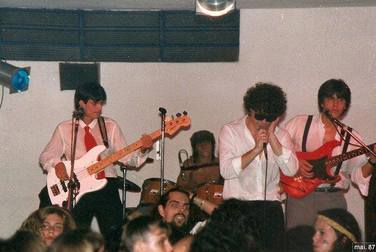
At age 16 Sergio’s Godfather gave him his first good guitar. It was a Fender Squire with 1 humbucker. It was at this time that Sergio started taking formal lessons. At the age of 17 his dad bought him a Mesa Boogie amplifier during one of his stops in Miami, FL. “I asked for a Fender Strat and a Marshall Amp, but the Marshall was too big to put on my dad’s plane,” he said. Instead, Ace Music in Miami sold his dad a Mesa Boogie combo amplifier and a Charvel Jackson #4 guitar, the first one made in Japan. “The first thing I did with my Mesa amplifier was blow it up,” he said smiling. “The power in Brazil is 220 volts and the 110 volt amplifier did not fair too well. This ended up being a good thing because I contacted Wander Taffo to give me advice on repairing my amp. At the time Wander was one the few musicians to have a rare Mesa Boogie amplifier in Brazil and Wander was also the guitar player of one of the largest Brazilian bands. He gave me his techs name and number and his tech fixed my amp for me,” Sergio explained. More importantly for Sergio, however, was he was now in contact with Wander who was a top name in the Brazilian music industry, one of Brazil’s best guitar players, and Sergio’s idol.
Wander Taffo informed Sergio of a Guitar Institute of Technology music course and invited Sergio to join. Sergio did just that and traveled 600 kilometers round trip (380 miles) once a week to take lessons. He did this from 1987-1988 and Taffo was his teacher. Sergio then started taking private lessons from Mozart Mello (Master). “Mozart was and still is one of the finest guitar teachers in all of Brazil.”
Wander Taffo informed Sergio of a Guitar Institute of Technology music course and invited Sergio to join. Sergio did just that and traveled 600 kilometers round trip (380 miles) once a week to take lessons. He did this from 1987-1988 and Taffo was his teacher. Sergio then started taking private lessons from Mozart Mello (Master). “Mozart was and still is one of the finest guitar teachers in all of Brazil.”
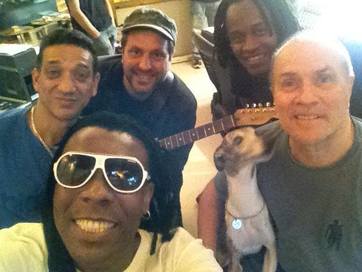
The Obina Shok Days
At this point Sergio is 18 years old and is rehearsing in his parent’s basement with Jean Pierre Senghor, a Senegal musician and member of Obina Shok. Obina is one of the precursors of reggae and African music in Brazil. Jean was 28 years old and would eventually become Cidade Negra’s keyboard player. Sergio went on to explain how he met Jean. “Our bass player was at this party and met Jean. Jean’s band, Obina Shok, had recorded 2 albums with one top ten hit. Jean had written two songs with Gilberto Gil, one of Brazil’s greatest artists. My bass player invited Jean to come play with us and Jean and I eventually became best friends. It was at this time that everything changed for me,” he added. Sergio started playing Reggae music and learning the craft of African guitar players, who Sergio believes are the best in the world. Jean eventually moved into Sergio’s parent’s house and they began to rehearse. They played for 2 years together as a duo. He told me, “You have what it takes. Don’t study 10 hours a day, it can suffocate what you really are, just play.” He encouraged Sergio to learn different styles of guitar and also taught him that guitar can be a percussive instrument. After this period Jean reformed Obina Shok and called on Sergio for the guitar position.
First Encounter With Cidade Negra
During an Obina Shok show in Rio de Janeiro, members from a newly formed band called Cidade Negra came and watched Sergio and Jean perform. Jean had been working with Cidade Negra in Rio in 1989 and the band members wanted to come and watch Obina Shok perform. A couple of months after the show, Cidade’s producer asked Sergio to fly to Rio to record a track for their new album. Sergio’s dad bought him a plane ticket and he flew out to record. Sergio ended up recording on 2 tracks, one which was Cidade Negra’s title track and first #1 hit. “Rio is different, you can be your own person and develop your own style. Unfortunately I did not have the money to live in Rio so after the recordings I headed back home, started working full time as a musician, and started saving money,” he said. “I’ve never worked a job outside of music,” Sergio added. At the age of 27 Sergio had saved enough money to move to Rio and he hooked back up with Jean.
The year is now 2000 and Sergio knew that Cidade Negra, now a multi-million selling band, was looking for a guitar player as Sergio was giving guitar lessons to the guitar player in the band. “He asked me to audition,” Sergio said. “I knew all of the songs as Cidade Negra was a famous band. The audition was very competitive with many of the top guitar players in Brazil trying out. “The audition was everything to me. I no longer had the emotional and financial support of my father who had recently passed away. I brought my prized Mesa Boogie amp, and my best pedals. I brought my real rig as I needed my signature guitar sound. Other players brought their digital processed gear and they did not have the sound that I had. I needed this gig and I held nothing back,” an emotional Sergio shared. “One week later I’m playing in front of 75,000 people-I loved it,” he said with a smile. “From there I was touring in Brazil and then off to Europe.”
At this point Sergio is 18 years old and is rehearsing in his parent’s basement with Jean Pierre Senghor, a Senegal musician and member of Obina Shok. Obina is one of the precursors of reggae and African music in Brazil. Jean was 28 years old and would eventually become Cidade Negra’s keyboard player. Sergio went on to explain how he met Jean. “Our bass player was at this party and met Jean. Jean’s band, Obina Shok, had recorded 2 albums with one top ten hit. Jean had written two songs with Gilberto Gil, one of Brazil’s greatest artists. My bass player invited Jean to come play with us and Jean and I eventually became best friends. It was at this time that everything changed for me,” he added. Sergio started playing Reggae music and learning the craft of African guitar players, who Sergio believes are the best in the world. Jean eventually moved into Sergio’s parent’s house and they began to rehearse. They played for 2 years together as a duo. He told me, “You have what it takes. Don’t study 10 hours a day, it can suffocate what you really are, just play.” He encouraged Sergio to learn different styles of guitar and also taught him that guitar can be a percussive instrument. After this period Jean reformed Obina Shok and called on Sergio for the guitar position.
First Encounter With Cidade Negra
During an Obina Shok show in Rio de Janeiro, members from a newly formed band called Cidade Negra came and watched Sergio and Jean perform. Jean had been working with Cidade Negra in Rio in 1989 and the band members wanted to come and watch Obina Shok perform. A couple of months after the show, Cidade’s producer asked Sergio to fly to Rio to record a track for their new album. Sergio’s dad bought him a plane ticket and he flew out to record. Sergio ended up recording on 2 tracks, one which was Cidade Negra’s title track and first #1 hit. “Rio is different, you can be your own person and develop your own style. Unfortunately I did not have the money to live in Rio so after the recordings I headed back home, started working full time as a musician, and started saving money,” he said. “I’ve never worked a job outside of music,” Sergio added. At the age of 27 Sergio had saved enough money to move to Rio and he hooked back up with Jean.
The year is now 2000 and Sergio knew that Cidade Negra, now a multi-million selling band, was looking for a guitar player as Sergio was giving guitar lessons to the guitar player in the band. “He asked me to audition,” Sergio said. “I knew all of the songs as Cidade Negra was a famous band. The audition was very competitive with many of the top guitar players in Brazil trying out. “The audition was everything to me. I no longer had the emotional and financial support of my father who had recently passed away. I brought my prized Mesa Boogie amp, and my best pedals. I brought my real rig as I needed my signature guitar sound. Other players brought their digital processed gear and they did not have the sound that I had. I needed this gig and I held nothing back,” an emotional Sergio shared. “One week later I’m playing in front of 75,000 people-I loved it,” he said with a smile. “From there I was touring in Brazil and then off to Europe.”
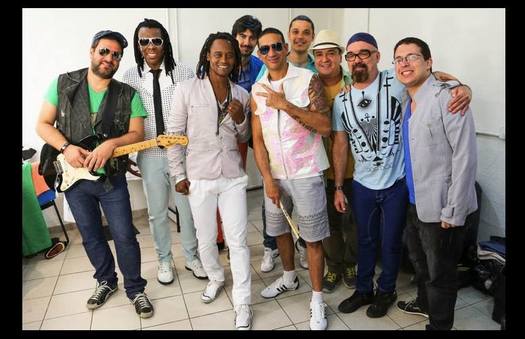
Life As A Reggae Star
The first tour with Cidade Negra was a reggae/rock tour. There were around 80 shows that Sergio played with the band. “There was a lot of pressure in the early days,” Sergio confessed. “With that said, the tour went great,” he added. Sergio played in front of huge crowds and the shows were always sold out. “The band improvised a lot on stage and was fantastic live. It was a very rich experience” he said. "During the tour, the band wrote music and prepared for the studio and a MTV unplugged tour. Even after that, I still worried if I would even stay in the band,” Sergio confessed. “Will I even be in the band after this tour?” Sergio’s worries would soon go away with the MTV unplugged album and tour.
Cidade Negra now was fully focused on the MTV Unplugged album and it would be the first reggae MTV Unplugged in the world. “This was totally different for us but everyone was doing it,” Sergio added. The entire experience of writing and arranging the album took 3 months. Cidade Negra did not take breaks. When the band was writing and recording an album, they would still tour but would cut the schedule back to around 8 shows a month instead of 15. Because of this intense schedule, Sergio had to learn how to create fast. Once the songs were written for the MTV Unplugged album, they rehearsed every day for 3 solid months to prepare for the live recording. During songwriting and preparation people would put Sergio on the spot and ask him to come up with parts. There was a lot of pressure on him. “It was not a comfortable situation, but I did it,” Sergio admitted.
The first tour with Cidade Negra was a reggae/rock tour. There were around 80 shows that Sergio played with the band. “There was a lot of pressure in the early days,” Sergio confessed. “With that said, the tour went great,” he added. Sergio played in front of huge crowds and the shows were always sold out. “The band improvised a lot on stage and was fantastic live. It was a very rich experience” he said. "During the tour, the band wrote music and prepared for the studio and a MTV unplugged tour. Even after that, I still worried if I would even stay in the band,” Sergio confessed. “Will I even be in the band after this tour?” Sergio’s worries would soon go away with the MTV unplugged album and tour.
Cidade Negra now was fully focused on the MTV Unplugged album and it would be the first reggae MTV Unplugged in the world. “This was totally different for us but everyone was doing it,” Sergio added. The entire experience of writing and arranging the album took 3 months. Cidade Negra did not take breaks. When the band was writing and recording an album, they would still tour but would cut the schedule back to around 8 shows a month instead of 15. Because of this intense schedule, Sergio had to learn how to create fast. Once the songs were written for the MTV Unplugged album, they rehearsed every day for 3 solid months to prepare for the live recording. During songwriting and preparation people would put Sergio on the spot and ask him to come up with parts. There was a lot of pressure on him. “It was not a comfortable situation, but I did it,” Sergio admitted.
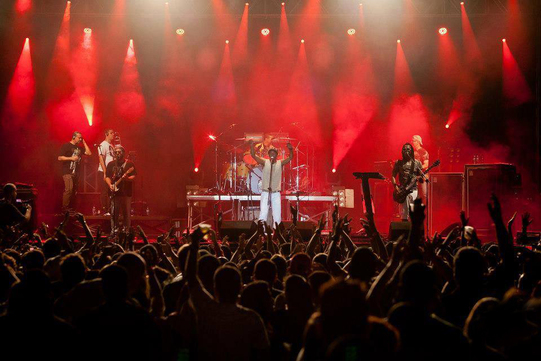
Cidade Negra’s Top Selling Album And Tour
Finally the day came and the show was recorded in front of a live audience. The MTV Unplugged recording was a huge success and would later prove to be Cidade Negra’s top selling album and tour. Sergio played a major role in the MTV Unplugged album and helped arrange the songs, as well as doing all of the post production guitar parts. He worked closely with the famous producer, Liminha. He also worked with top producer Welsh and bassist Paul Ralphes who was the main songwriter of the world hit “I hear you Call” from Bliss band, Paul’s former band. The MTV unplugged album also gave Sergio his first interview with Guitar Player magazine. He was able to perform with Gilberto Gil, one of the most important artists of all time. “After this I knew I would be in the band as long as I wanted to. I would only leave on my terms,” he said proudly.
After the recording, Sergio and Cidade Negra embarked on a massive 2 year/350 show tour to support the MTV Unplugged Album. “There was no time for anything else, just tour. Some people think that you just play the 90 minute show and that is it. There was a lot more to the tour schedule. We averaged around 15 shows a month for a solid 2 years. Flying on airplanes, traveling in buses, promotion schedule, TV/Radio appearances, live shows. It was a lot of work,” Sergio said. The flip side to all of this, however, was the success that Sergio and Cidade Negra enjoyed from the MTV Unplugged album and tour. Many songs went #1 and they always played in front of huge crowds of 50,000 or more. Some of the band’s larger shows would top over 1 million in attendance with the largest show having around 2.5 million fans in the audience. “I loved everything and this is when we started making the real money,” Sergio added. “I always loved going out of the country and Europe was my favorite place to tour. In addition to Europe and Brazil, I traveled to and toured in Africa, Japan, Russia, USA, and other countries. I played twice at the Montreux Jazz Festival in 2003 and 2012, and Rock in Rio in 2011,” he said. Sergio also met his wife, Priscila, on the road years later. Sergio was playing a concert in Brazil and spotted Priscila in the crowd. “As soon as I seen her, I knew she would be my wife,” Sergio said with a smile. Sergio also worked with Toni Garrido, Cidade Negra’s singer, on his first solo album and tour and that lead to Sergio’s second Guitar Player magazine interview.
Finally the day came and the show was recorded in front of a live audience. The MTV Unplugged recording was a huge success and would later prove to be Cidade Negra’s top selling album and tour. Sergio played a major role in the MTV Unplugged album and helped arrange the songs, as well as doing all of the post production guitar parts. He worked closely with the famous producer, Liminha. He also worked with top producer Welsh and bassist Paul Ralphes who was the main songwriter of the world hit “I hear you Call” from Bliss band, Paul’s former band. The MTV unplugged album also gave Sergio his first interview with Guitar Player magazine. He was able to perform with Gilberto Gil, one of the most important artists of all time. “After this I knew I would be in the band as long as I wanted to. I would only leave on my terms,” he said proudly.
After the recording, Sergio and Cidade Negra embarked on a massive 2 year/350 show tour to support the MTV Unplugged Album. “There was no time for anything else, just tour. Some people think that you just play the 90 minute show and that is it. There was a lot more to the tour schedule. We averaged around 15 shows a month for a solid 2 years. Flying on airplanes, traveling in buses, promotion schedule, TV/Radio appearances, live shows. It was a lot of work,” Sergio said. The flip side to all of this, however, was the success that Sergio and Cidade Negra enjoyed from the MTV Unplugged album and tour. Many songs went #1 and they always played in front of huge crowds of 50,000 or more. Some of the band’s larger shows would top over 1 million in attendance with the largest show having around 2.5 million fans in the audience. “I loved everything and this is when we started making the real money,” Sergio added. “I always loved going out of the country and Europe was my favorite place to tour. In addition to Europe and Brazil, I traveled to and toured in Africa, Japan, Russia, USA, and other countries. I played twice at the Montreux Jazz Festival in 2003 and 2012, and Rock in Rio in 2011,” he said. Sergio also met his wife, Priscila, on the road years later. Sergio was playing a concert in Brazil and spotted Priscila in the crowd. “As soon as I seen her, I knew she would be my wife,” Sergio said with a smile. Sergio also worked with Toni Garrido, Cidade Negra’s singer, on his first solo album and tour and that lead to Sergio’s second Guitar Player magazine interview.
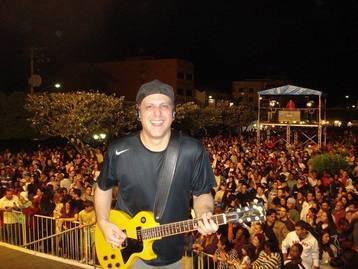
The End Of An Era
Touring and success was great but also begin to take its toll on Sergio. “People expect you to perform and it’s not exactly fun every time,” he said. Then came the demanding travel and tour schedule. “I would wake up and not know where I was. Where am I? What city am I in? Am I late? It was not always a great experience,” he added. “Being on the road is crazy. I can’t say enough how happy I am to be here right now, to be alive, to be well,” Sergio shared. After a while you begin to think about your safety. What if something goes wrong? Do we have an evacuation plan? Then security started getting bad, I found bullet holes in my guitar cases and pedals. One concert Sergio witnessed a policeman abusing one of the fans. On stage, Cidade’s vocalist asked the cop to not push people. The cop yelled at him, “F You and shut up. You do your job and I’ll do mine.” It happened again at one of the last concerts Sergio played. This time the Brazilian cop went off on the singer and reached for his gun. It got so bad the band had to stop the show and go back to the dressing room.
Touring and success was great but also begin to take its toll on Sergio. “People expect you to perform and it’s not exactly fun every time,” he said. Then came the demanding travel and tour schedule. “I would wake up and not know where I was. Where am I? What city am I in? Am I late? It was not always a great experience,” he added. “Being on the road is crazy. I can’t say enough how happy I am to be here right now, to be alive, to be well,” Sergio shared. After a while you begin to think about your safety. What if something goes wrong? Do we have an evacuation plan? Then security started getting bad, I found bullet holes in my guitar cases and pedals. One concert Sergio witnessed a policeman abusing one of the fans. On stage, Cidade’s vocalist asked the cop to not push people. The cop yelled at him, “F You and shut up. You do your job and I’ll do mine.” It happened again at one of the last concerts Sergio played. This time the Brazilian cop went off on the singer and reached for his gun. It got so bad the band had to stop the show and go back to the dressing room.
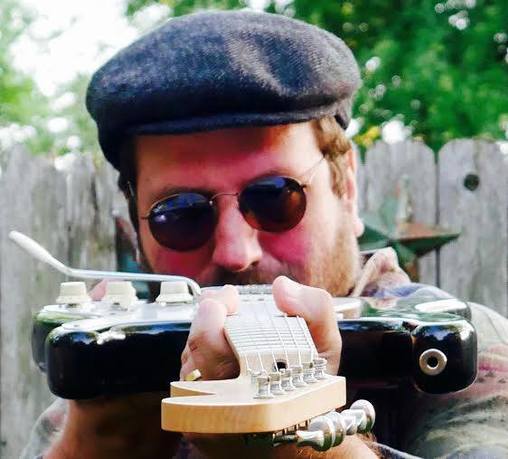
A New Chapter
Like all things in life, there comes time for an ending. The year was 2012 and after 15 years of recording and touring with Cidade Negra, Sergio decided to part ways with the band and move onto another chapter in his life. “The road is not as easy as people think and I was starting to fear for my life and was really tired and needing to change direction and do something else,” Sergio confessed. “I quit the band and 10 days later I came to the USA on a 01 Visa, a very rare Visa to get. The first 8 months in the USA, Sergio did not do much musically and was not sure if he even wanted to play again. “Then I started to want to play again and I felt in love with music and guitar again like I did when I was a teen. I played in a band on a porch of the house on a ranch. It was very different than anything I did before, and I liked it,” he said. “I’m more on this side now,” he added.
Sergio is currently playing with a variety of musicians around the Austin area performing live, and also recording and producing. He is starting to do gear demos for The Austin Guitar House, a high end boutique guitar store in Austin, TX. Along with this, he has done gear demos for Cardinal Guitars, Swart amps, and K Line guitars. Though he does not know exactly what the future will hold, he says he is enjoying his life in Austin, TX USA. He said he’s ready to our again if the right situation comes up but, currently, is enjoying his time with his beautiful wife, Priscila. In reflecting back to his days in Cidade Negra Sergio said, “Music led me to this and led me out of this, after all my life has always been about music.”
Like all things in life, there comes time for an ending. The year was 2012 and after 15 years of recording and touring with Cidade Negra, Sergio decided to part ways with the band and move onto another chapter in his life. “The road is not as easy as people think and I was starting to fear for my life and was really tired and needing to change direction and do something else,” Sergio confessed. “I quit the band and 10 days later I came to the USA on a 01 Visa, a very rare Visa to get. The first 8 months in the USA, Sergio did not do much musically and was not sure if he even wanted to play again. “Then I started to want to play again and I felt in love with music and guitar again like I did when I was a teen. I played in a band on a porch of the house on a ranch. It was very different than anything I did before, and I liked it,” he said. “I’m more on this side now,” he added.
Sergio is currently playing with a variety of musicians around the Austin area performing live, and also recording and producing. He is starting to do gear demos for The Austin Guitar House, a high end boutique guitar store in Austin, TX. Along with this, he has done gear demos for Cardinal Guitars, Swart amps, and K Line guitars. Though he does not know exactly what the future will hold, he says he is enjoying his life in Austin, TX USA. He said he’s ready to our again if the right situation comes up but, currently, is enjoying his time with his beautiful wife, Priscila. In reflecting back to his days in Cidade Negra Sergio said, “Music led me to this and led me out of this, after all my life has always been about music.”
